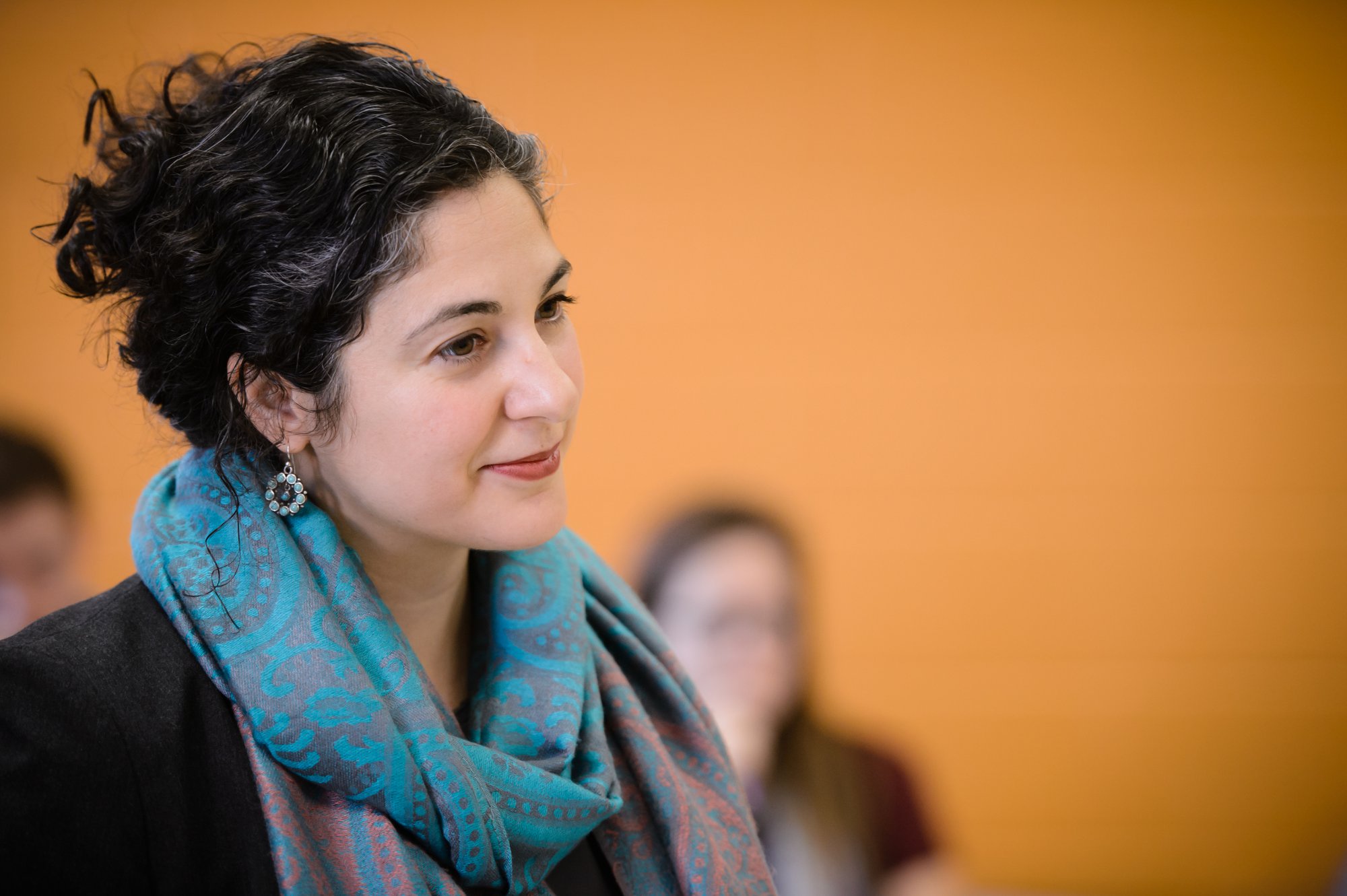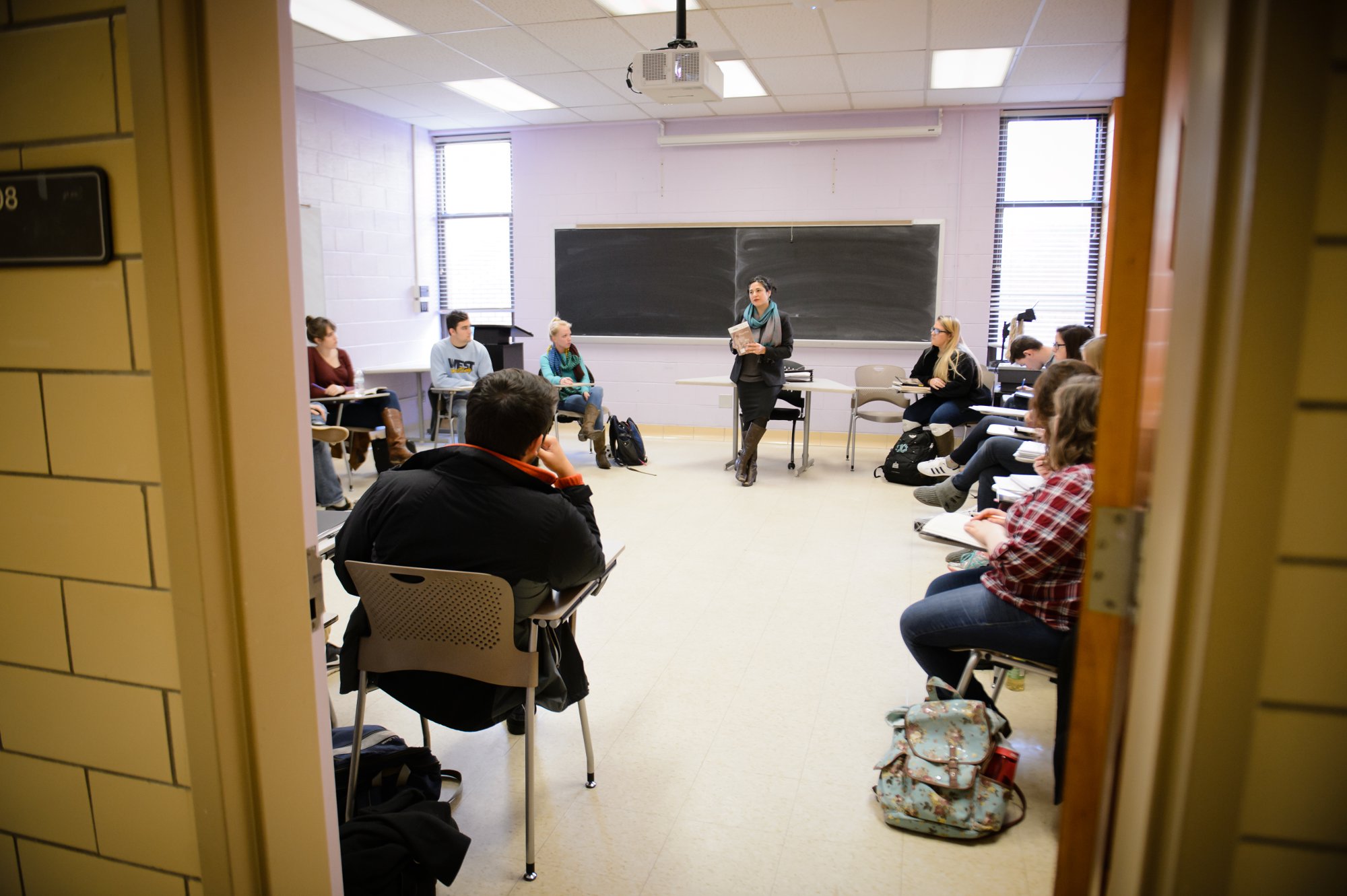no easy answers
by Jemma Everyhope-Roser
photos by Craig Mahaffey

Angela Naimou, as a scholar of literature, asks the hard questions, questions that demand thought—that command a pause.
When Angela Naimou was a teenager and computers were young, her father would hand her a scrawled stack of notes, and say, “Oh, could you please type this letter up?” Naimou, paging through the writing, would realize that it was someone’s refugee application and that she was supposed to type up their account of what happened to them, having been persecuted by Saddam Hussein’s government in Iraq.
“It was a very daunting thing for me, as a teenager,” Naimou says. “Because, first of all, it can be very difficult material, and these people were friends of the family, or family members.”
Sitting in her Michigan home, before her blinking cursor on her blank page, Naimou knew so much rode on these applications. Customs officials would be reviewing the documents, looking for “the right story,” a story that was similar enough to others in detail but also unique enough to constitute an original experience. If she turned these jotted notes into sentences, did that mean she made the decisions a writer, a biographer, would make? Everything depended on staying true to the personal accounts while convincing the reader who’d process this application.
“To me, that’s really fascinating,” Naimou says. “You can be in this weird place of statelessness, and so much depends on your story and how you tell it.”
Naimou’s parents immigrated in the late ’60s and early ’70s, and her father always told her he’d never return to Iraq. Not until Saddam Hussein was gone. Even though some of Naimou’s relatives, part of an Iraqi Christian minority called Chaldeans, have returned in order to work as interpreters, Naimou herself has never visited the land of her parents’ birth, and considering the recent destruction of the Iraqi state and turmoil in the region, it’s an open question as to whether she ever will.
But perhaps it’s unanswerable personal questions like these that drive Naimou’s professional inquiries, as an assistant professor of U.S. literature and cultural studies at Clemson, to such intense, daunting subjects.
Her recently published book,Salvage Work: U.S. and Caribbean Literatures amid the Debris of Legal Personhood, explores the ultimately unresolvable questions of evolving identity, legal personhood and statelessness. Using the lens of contemporary literature, Naimou delves into legal background of these stories, to see, as she says, “the way literature shapes our historical imagination.” Salvage Work explores how past laws in the United States, Puerto Rico, and Haiti continue to shape our ideas of personhood into the twenty-first century, from the legal identities of the slave to those of the refugee, the disappeared, the sex worker, the corporation, the sailor, the fugitive, the pregnant woman, and the fetus, among others. Naimou hopes to demonstrate that contemporary fiction can generate provocative responses to these histories of legal identity and, in the process, reimagine what it means to be human and to live together in an ethical way.
In one chapter of the book, for example, she uses literary analysis and historical documents to uncover mariners’ identities, exploring possible modern ramifications based on historical sailors being press-ganged, or kidnapped and forced into service at sea; not legally slaves, neither were these men free. Complicating this further are the ambiguity of maritime international borders and the vagaries of maritime law. Naimou traces this history, along with the labor and penal histories of New York, in relation to the maritime fiction of Herman Melville’s 1855 novella Benito Cereno and Francisco Goldman’s 1997 novel The Ordinary Seaman.

For every course, Naimou tries to include material on the syllabus that is completely new to her: “Then I get to read and learn right along with my students.”
But the idea that lends this scholarly work its title is that of the aesthetics of salvage, namely, Naimou says, that “salvage is a kind of partial recuperation, that you can pull from the ruins of history without erasing the marks of that history, of what can be painful, of what can be vast in shaping contemporary life.”
With this project recently having come to an end, Naimou must consider what’s next.
But, in the meantime, she does have something to tide her over. In a special issue of College Literature called “The Banalization of War” that she’s coediting with Graham MacPhee of West Chester University, she’s written a short piece concerning the debates over refugees and migrants in Europe and the United States as people to be welcomed, feared, pitied, or punished. Naimou examines what kinds of meanings are attributed to the category of refugee when used to identify those not only from the Middle East and Africa but also those fleeing Central America and Mexico. As part of her developing interest in art of the contemporary African diaspora, she’s also interviewed one of the most important artists working today, the Nairobi-born, Brooklyn-based artist Wangechi Mutu.
Before she can launch herself into a new book project, Naimou must first read new literature and study visual art, picking out the works that lend themselves to her type of in-depth analysis. Usually, she selects novels that experiment with language or poems that get her thinking about bigger things, or artwork that references histories she didn’t even know about. “I’m drawn to literature, essays, and art that demand a pause,” Naimou says, “and demand thinking without an easy answer. It’s not for the sake of being difficult alone, but it’s what difficulty allows.
“When we listen to our artists and our writers and engage with them and with each other through art, literature, or essays, spaces open up for real conversation,” Naimou says, “and it’s not because they agree. It’s because they ask so much of readers and viewers, inviting us to contend with disagreement and to imagine alternative visions for living in the world.”
As with her research for Salvage Work, Naimou plans to pair her study of literature and art with an exploration of how law constructs the concepts and meanings that shape society and culture. Combing through case studies and other original sources, she’ll piece together how the iterations of legal concepts have changed over time to culminate in the work before her, a snapshot in an ever-changing history.
“This approach to research requires things of me that I didn’t expect when I first began studying literature, like reading legal cases or reading histories of sailors or the slave trade,” Naimou says. “But basically learning from so many other disciplines for me has really been important. I’m resisting the idea that anyone is an expert or master of knowledge, but rather, that we’re always engaged in the process of gathering knowledge, of thinking, of reflecting, and in doing so, we’re bringing people and ideas from various fields into conversation with each other.”
In the end, for all Naimou’s use of law and history, her questions are attuned to, as she says, literature, and the generative power of art. For her, the way that art continues to shape how we give meaning to the world will help us all gain insights that are timely and worth sharing.


